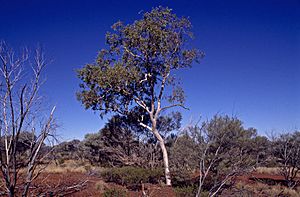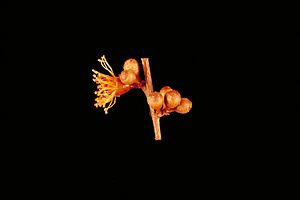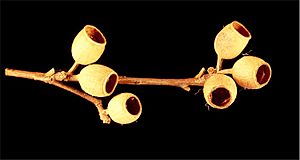Pilbara ghost gum facts for kids
Quick facts for kids Pilbara ghost gum |
|
|---|---|
 |
|
| Corymbia ferriticola in the Gibson Desert | |
| Scientific classification | |
| Genus: |
Corymbia
|
| Species: |
ferriticola
|
| Synonyms | |
|
|
The Corymbia ferriticola, also known as the Pilbara ghost gum, is a special type of tree or a small, bushy plant called a mallee. It grows only in Western Australia. This plant has smooth bark and leaves shaped like a spear. Its flower buds grow in groups of seven, and the flowers are a creamy white color. After flowering, it produces fruit that looks like a short, round or tube-shaped capsule.
Contents
What the Pilbara Ghost Gum Looks Like
The Pilbara ghost gum can be a tall, thin tree or a smaller, bushy mallee. It sometimes grows up to 15 m (49 ft) tall, but it's often much shorter. This plant has a special woody swelling at its base called a lignotuber. This helps it regrow after fires.
Its bark is usually white and powdery. It can also be pink and turn light brown as it gets older. Sometimes, the bark at the bottom of the tree is rough and grey.
Young plants and new shoots have heart-shaped, egg-shaped, or spear-shaped leaves. These leaves are about 35–80 mm (1.4–3.1 in) long and 13–37 mm (0.51–1.46 in) wide. They grow on a short stem called a petiole.
Adult leaves are arranged one after another along the stem. They are also spear-shaped and can be a bit wavy. These leaves are about 40–100 mm (1.6–3.9 in) long and 6–22 mm (0.24–0.87 in) wide. Their petiole is about 3–12 mm (0.12–0.47 in) long.
The flower buds grow in the leaf axils (the spot where a leaf joins the stem). They are on a small, branched stalk called a peduncle, which is up to 2 mm (0.079 in) long. Each branch of this stalk holds seven buds. Each bud has its own tiny stem, called a pedicel, about 2–5 mm (0.079–0.197 in) long.
When the buds are ready, they look like small pears. They are about 4–5 mm (0.16–0.20 in) long and 3–4 mm (0.12–0.16 in) wide. The top part of the bud, called the operculum, is flat. The flowers are creamy white and have been seen blooming in December and January.
After the flowers, the plant produces woody fruit. This fruit is a capsule that is short and can be round or like a cylinder. It measures about 6–10 mm (0.24–0.39 in) long and 4–9 mm (0.16–0.35 in) wide. The parts that open to release seeds are hidden inside the fruit.
How the Pilbara Ghost Gum Got Its Name
The Pilbara ghost gum was first officially described in 1986. Two scientists, Ian Brooker and Walter Brian Edgecombe, wrote about it in a science journal called Nuytsia. They first named it Eucalyptus ferriticola.
Later, in 1995, two other scientists, Ken Hill and Lawrie Johnson, changed its name. They moved it to a different group of plants, so its name became Corymbia ferriticola.
Where the Pilbara Ghost Gum Lives
The Pilbara ghost gum mostly grows in the Pilbara region of Western Australia. It likes to live on hills made of ironstone, inside deep valleys called gorges, and on steep slopes. You can also find smaller groups of these plants near Mount Augustus, Meekatharra, and in the Gibson Desert.
Is the Pilbara Ghost Gum Safe?
The Western Australian Government's Department of Parks and Wildlife has looked at the Pilbara ghost gum. They have officially said that this type of eucalypt is "not threatened." This means it is not in danger of disappearing.



